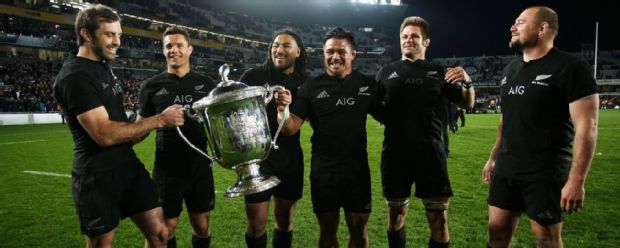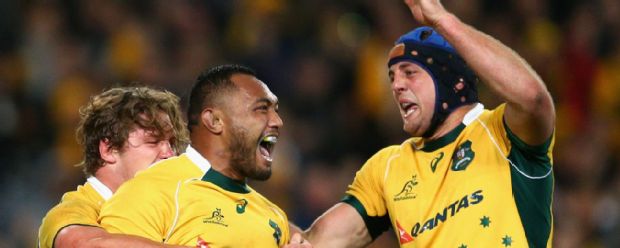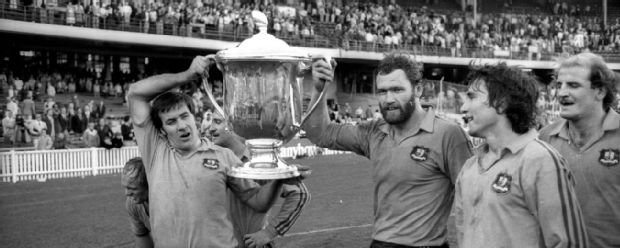|
Rugby World Cup
Australia's bandwagon 'don't gives a rats' attitude to rugby can irk Kiwis
Greg Growden
October 28, 2015
Will All Blacks or Wallabies win rugby's biggest prize?
New Zealand will always look upon South Africa as their traditional rugby rival. The links between these two countries that treat the 15-man game as its heart and soul is intense. Australians may look upon New Zealand as their No.1 rugby opponents, yet they are instead regarded by numerous Kiwis as that irritating bunch of arrogant loudmouths who will stoop to anything to win; a certain underarm incident may have happened in another sport, but it will never be forgotten from the Bay of Islands to Invercargill. Supposedly close ANZAC partners Australia and New Zealand may be, often standing together in battle, but it can be a cantankerous relationship. Losing to the Wallabies irks the New Zealanders so much, probably more than a South African defeat, because Kiwis often cast a cynical eye towards Australia believing they are a clumsy, brash, junior partner, who only occasionally holds the cherished game of rugby firmly to its bosom. The mood of New Zealand, meanwhile, is deeply entwined with the fortunes of its national rugby team. They treat an All Blacks Test victory as a given. A Test loss is simply unacceptable, and a general sense of gloom encompasses its two islands.  The All Blacks pose with the Bledisloe Cup following victory against Australia© Hagen Hopkins/Getty Images Australia truly becomes interested in rugby only when the national team gets it act together; the nation as quickly ignores the sport when the Wallabies become woeful, which has been quite often and sometimes lasted decades. Many Australians are masters of hopping onto a bandwagon and as quickly leaping off. They move on. That Australian 'don't gives a rats' attitude can irk the Kiwis as well, especially when a country which has rugby as its national sport feels it is being threatened by another nation where the sport is only the fourth- and occasionally third- ranked football code. The Kiwis similarly know how to irk Australians. In Australia are countless South Africans, English, Welsh, Irish, Scots who have changed their allegiances and become fervent Wallabies supporters; they treat it as part of living and thriving in a new country.
Which player would you most like to drink with?
%]But Australia is also the home for hundreds of thousands of New Zealanders, and that most rare of breeds is the Kiwi who has become a committed Wallabies follower. There are a few, but not many. A high percentage of expat New Zealanders fervently hold onto their home allegiances, which can make the days before and after a Bledisloe Cup match such an excruciating experience in the Australian workplace. The All Blacks jersey can be as common a sight as the green and gold in Sydney and Brisbane streets in the weeks before a trans-Tasman international. For the Wallabies, Bledisloe Cup matches in Sydney often feel like an away fixture as New Zealanders, both local and who have travelled across 'the Ditch', commandeer the terraces. As Wallabies centre Tim Horan said after one Bledisloe Cup win: 'You know, the best part about beating New Zealand is that Australians who've been copping it season after season from Kiwis at work (there's always a Kiwi in the joint) can go to work on Monday morning and give them both barrels." 'We showed you,' is a common call in countless Australian offices following an All Blacks win over the Wallabies. This often unbearable 'we showed you' brigade believe they are the rugby masters and that countries like Australia are mere apprentices- a justifiable trait as after all they hail from a country that has turned the game into an art form. The most dominant of art forms. For good reason Australia has long felt intimidated about playing New Zealand. The general tone was portrayed in an 1884 editorial in The Sydney Morning Herald. "Rugby isn't our game,' it said. "We'll always court defeat if we play the New Zealanders." Defeat has been common, but not always. New Zealand 105 wins. Australia 42. Draws 7. There have been numerous barren periods for Australia - such as 10 losses in a row to the All Blacks between 2008 and 2010, nine successive losses between 1936 and 1947, and seven in a row between 1967 1974 and 1995 1997. The All Blacks currently have lost just one of their past 12 Tests against Australia. The Wallabies have never achieved any more than three successive test wins over New Zealand.  © Cameron Spencer/Getty Images With it has come some really tough times, such as when the Wallabies headed to New Zealand in 1946 and the players were forced to sleep two to a bed in their Invercargill hotel. Fleeing the hotel, the team headed to a dormitory where they had to hammer nails into the wall so they had somewhere to hang their clothes. To add to their indignity, New Zealand officials suggested the Wallabies should take on a Kiwi coach. The Wallabies lost both Tests. The Bledisloe Cup was introduced in the 1930s for trans-Tasman Tests, but it took a long while to be embraced. The Australians probably purposely ignored the cup, because it was too much of a reminder of how close the local game had come to collapse. The 1950s and 60s were grim times for the code, which was deep in the shadow of rugby league. In 1951 the Australian team played in front of virtually an empty house at the 'Gabba in Brisbane. Only 4800 spectators could be bothered attending to see Australia lose one more time to the All Blacks.
Do you have any pre-match superstitions?
%]Yet Australia constantly looked towards New Zealand for ideas and inspiration, using their neighbours as the spur to improve their own act. There is only so much humiliation any country can take. One who was willing to embrace the New Zealand rugby way was Australian player and then Test coach David Brockhoff. His philosophy, inspired primarily by New Zealand coach Vic Kavanagh, involved embracing the powerful rucking game, which relied upon organising a fierce, dominant pack and making them brutal at the breakdown and scrum. To match New Zealand, you similarly had to be mongrel dogs. It all came to a head in 1979. The All Blacks had agreed to play a one-off Test at the Sydney Cricket Ground to again help the Australian Rugby Union through its financial difficulties. On the morning of the match, the players were made aware that the Bledisloe Cup would be part of the bargain when they heard the All Blacks had brought it with them from Auckland. The cup remained an unknown bit of silverware in Australia, and for good reason, considering the Wallabies had not their hands on it since 1949. So when they won it back in Sydney 30 years on by beating the All Blacks 12-6, Brockhoff wasn't going to waste the moment. He leapt the fence, embraced his warriors and thrust the cup into their hands before joining them in a memorable lap of honour. The crowd responded, creating easily one of the most memorable scenes of Australian rugby history.  © Wallabies Geoff Shaw, Mark Loane, Tony Melrose and Tony Shaw parade the Bledisloe Cup aouind the SCG. The trans-Tasman rugby stoush now really meant something. And all this came just a few years after former All Blacks skipper Wilson Whineray said: "No one ever bothered about the Bledisloe Cup in my day. It just sat in someone's office." As the Wallabies ran around the ground, the All Blacks watched despairingly from the SCG's visitors' dressing room. Forward Andy Haden, who had given his All Blacks jersey to Brockhoff, beckoned his team-mates to the window, pointed at the overjoyed Wallabies and made a pact that this would never happen again. Suddenly the All Blacks began to respect that rag-tag mob from the other side of the Ditch..
Lomu: 'New Zealand know how to deal with the pressure'
%]That respect remains, even it is at times begrudging. Trans-Tasman Tests are generally free of filth even though there has been the occasional outbreak of madness, including Richard Loe's rabbit-chop of Paul Carozza in 1992, and Colin Meads becoming Australian public enemy No.1 in 1968 after he wrenched Ken Catchpole's leg from the bottom of a maul. But the bulk of the games are good clean affairs. The Bledisloe Cup is on one level. But the World Cup is on a far higher platform - especially as the teams have never before played each other in the tournament final - and this involves enormous bragging rights either side of the Tasman. For weeks, months, this weekend's result will undoubtedly be the first subject of discussion whenever Australians and New Zealanders meet. Work could easily come to a standstill Monday morning. In one country, it will be bliss, the other bedlam. Not everyone will get over it. © ESPN Sports Media Ltd.
|
Live Sports
Communication error please reload the page.
-
Football
-
Cricket
-
Rugby
-
- Days
- Hrs
- Mins
- Secs
F1 - Abu Dhabi GP
Abu Dhabi Grand Prix December 11-131. Max Verstappen ()
2. Valtteri Bottas (Mercedes)
3. Lewis Hamilton (Mercedes)
4. Alexander Albon ()
5. Lando Norris ()
6. Carlos Sainz Jr ()
-
ESPNOtherLive >>
Darts - Premier League
Golf - Houston Open
Snooker - China Open
Tennis - Miami Open

